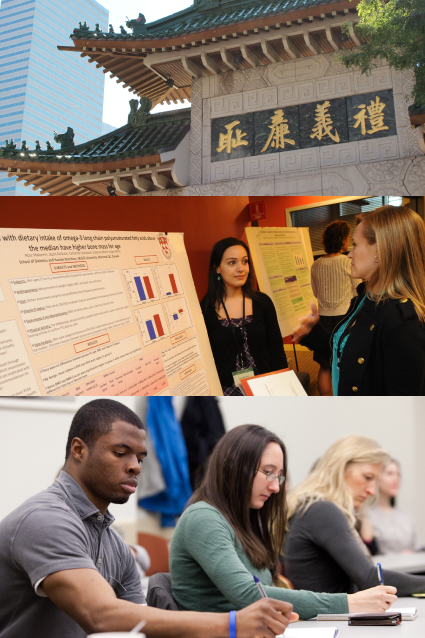The effects of dietary intake and nutritional status on health are complex. Understanding and untangling specific effects of overall diet and individual nutrients requires an understanding of the complex interactions among dietary, lifestyle, metabolic and genetic exposures and the critical-thinking skills for clarifying them in population-based data.
The Nutrition Epidemiology and Data Science program is designed to train students in the design, implementation, and analysis of epidemiologic studies that address questions of the role of dietary intake and nutritional status in disease prevention.

The Nutrition Epidemiology and Data Science Program combines traditional academic course work with practical training, so that students acquire an in-depth knowledge in general nutrition, nutritional biochemistry and physiology, biostatistics, and epidemiology. Students develop an understanding of how to design and conduct epidemiologic research studies, and gain hands-on experience in essential techniques in data analysis and presentation.
This program and its faculty are in the Division of Nutrition Epidemiology and Data Science.
Students take most of their academic courses at the Friedman School of Nutrition Science and Policy although additional courses in advanced epidemiology and statistics are available by cross-registration at Boston University and at the Harvard School of Public Health.
Prerequisites
- To be eligible applicants must have completed a Bachelor's degree.
- The school has permanently removed the GRE as a requirement. However, applicants to the PhD program are strongly encouraged to submit GRE scores as they can be helpful in the Admissions Committee’s assessment of readiness for doctoral study. Read more about this new change in admissions policy and what it means for your application to the school. For students taking the GRE who seek to refresh their verbal and quantitative skills, self-study materials and sample questions are available from the Educational Testing Service. Students whose native language is not English must meet TOEFL or IELTS requirements.
Nutrition Science or Global Nutrition Epidemiology or Nutrition Epidemiology and Data Analytics Specialization Options
- Students planning on completing the Nutrition Epidemiology and Data Analytics or Global Nutrition Epidemiology or are planning on designing their own specialization will need to complete undergraduate level courses in General Chemistry and General Biology.
- The curriculum includes core courses in the areas of nutrition, biochemistry, biostatistics, and epidemiology. A minimum of 48 semester hour units is required for the M.S. degree. Unless otherwise noted, each course is equivalent to three semester hour units. The exact number of required courses will depend upon the student's prior academic preparation.
Biochemical and Molecular Nutrition Specialization Option
- Students planning on completing the Biochemical and Molecular Nutrition specialization with the Nutrition Epidemiology and Data Science division will need to complete undergraduate level courses in general nutrition, general biology, general chemistry (with lab), organic chemistry and biochemistry.
Please be advised that students taking General Nutrition courses to fulfill program prerequisites must have those courses approved by the Friedman School in advance.
Doctor of Philosophy
Students enrolled in the doctoral program must have completed courses equivalent to the Nutrition Epidemiology master's degree based on previous graduate-level coursework taken either at the Friedman School or elsewhere. Students entering at the Ph.D. level must complete or be exempted from all required courses of the M.S. curriculum. Students in the doctoral program must first pass a written and oral qualifying examination, and then complete and formally defend a doctoral dissertation based on original research. For more information about that application and admissions process for the doctoral program, please click HERE.
Combined Degree Programs: MS/MPH
A combined degree program, in association with Tufts University's School of Medicine, leads to the Master of Science and the Master of Public Health. Learn more about this combined degree program.
Division Faculty

Kenneth Kwan Ho Chui
Associate Professor, Secondary Faculty

Mei Chung
Associate Professor

Misha Eliasziw
Associate Professor, Secondary Faculty

David Gute
Professor, Secondary Faculty

Paul F. Jacques
Professor

Eileen Kennedy
Professor

Jiantao Ma
Assistant Professor

Dariush Mozaffarian
Distinguished Professor

Aviva Must
Professor, Secondary Faculty

Elena N. Naumova
Professor

José M. Ordovás
Professor

Tammy Scott
Research Assistant Professor

David Tybor
Assistant Professor, Secondary Faculty

Lu Wang
Research Assistant Professor
Fang Fang Zhang
Associate Professor
Students wishing to view the MS or PhD degree requirement worksheet associated with their year of entry for the most accurate requirements.
The nutrition core provides students with an understanding of basic and applied nutrition, biostatistics, and nutrition science policy. Courses in these areas reflect the broad science and policy mission of the school. Students entering with an appropriate master's degree may submit requests to waive individual courses or to take exemption exams.
Epidemiology and Biostatistics Required Skills Courses
- Core courses to complete during first fall semester:
- Principles of Epidemiology (NUTR 0204)
- Biostatistics I plus required Laboratory (NUTR 0206)
- Data Management Using SAS (NUTR 0237)
- Nutrition Science Journal Club (NUTR 0240; first of two-semester sequenced 0 SHU course)
- Core courses to complete during first spring semester:
- Nutrition Science Journal Club (NUTR 0240; second of two-semester sequenced 0 SHU course)
- Biostatistics II (NUTR 0309)
- Intermediate Epidemiology (NUTR 0319)
- Core courses to complete during second fall semester:
- Nutritional Epidemiology (NUTR 0305)
- Advanced Data Analysis (NUTR 0394)
Nutrition Science Required Skills Courses for all Specializations except Biochemical and Molecular Nutrition Specialization
- Scientific Basis of Nutrition: Micronutrients (NUTR 0245; first of two semester-sequenced course)
- Scientific Basis of Nutrition: Macronutrients (NUTR 0246; second of two semester-sequenced course)
Specialization Requirement – Select One Option
- Biochemical and Molecular Nutrition Specialization:
- Graduate Biochemistry (BCHM 0223; 6 SHUs)
- Nutritional Biochemistry and Physiology: Macronutrients (NUTR 0370; 4.5 SHUs)
- Nutritional Biochemistry and Physiology: Micronutrients (NUTR 0371; 4.5 SHUs)
- Global Nutrition Epidemiology Specialization:
- Fundamentals of Nutrition Policy and Programming (NUTR 0203)
- Select two of the following courses:
- Monitoring and Evaluation of Nutrition and Food Security Projects (NUTR 0217)
- International Nutrition Programs (NUTR 0227)
- Community and Public Health Nutrition (NUTR 0228)
- Nutrition in Emergencies Policies, Practice and Decision-Making (NUTR 0308)
- Nutrition Systematic Reviews and Knowledge Translation (NUTR 0392)
- Nutrition Epidemiology and Data Analytics Specialization:
- Fundamentals of GIS (NUTR 0231)
- Select TWO of the following courses:
- Advanced GIS (GIS 0102)
- Nutrition Systematic Reviews and Knowledge Translation (NUTR 0392)
- Data Visualization and Effective Communication (NUTR 0393)
- Advanced Data Analysis (NUTR 0394)
- Entrepreneurship and Innovation in Nutrition
- Select at least 3 SHUs or more of these courses:
- Food from Production to the Marketplace (NUTR 0226)
- Nutrition and Entrepreneurship (NUTR 0280)
- Plus at least 6 SHUs from this list of courses:
- Social Media for Health & Nutrition Communication (NUTR 0213)
- Social Psychology of Eating Behavior (NUTR 0273)
- Corporate Social Responsibility in the Food Industry (NUTR 0278)
- Food Law and Regulation (NUTR 0284)
- Communicating Health Information to Diverse Audiences (NUTR 0306)
- Food Industry’s Role in Food System Sustainability (NUTR 0344)
- Data Visualization and Effective Communication (NUTR 0393)
- Self-Designed Specialization (consult with Academic Advisor and Division Chair)
Optional Master’s Thesis
- Preliminary Research (NUTR 0397; first summer semester)
- Thesis Proposal (NUTR 0397; second fall semester)
- Dissertation (NUTR 0497; second spring semester)
Potential Electives
- Directed Study with NEDS faculty
- Cardiovascular Epidemiology (PH 0220)
- Cancer Epidemiology (PH 0226)
- Infectious Disease Epidemiology (PH 0224)
The interactive relationship with other programs within the school; with the Tufts University School of Medicine, the Tufts Medical Center, and the Jean Mayer USDA Human Nutrition Research Center on Aging, provides a rich environment for collaborative and cross-discipline instruction. Our affiliation with several longitudinal studies, including the Framingham Heart Study, the Normative Aging Study, and the Baltimore Longitudinal Study on Aging, provides opportunities for direct research experience.
Jean Mayer USDA Human Nutrition Research Center on Aging
Scientists at the HNRCA examine how nutrition impacts healthy aging and the role nutrition plays in preventing diseases of the aging. The HNRCA, which is an independent research facility located two blocks away from the Friedman school on the Tufts Boston campus, was established in 1977 as a unique partnership between the USDA and the University. Many of the scientists at the HNRCA’s 20 research labs are also Friedman School faculty. Friedman students have unique opportunities to conduct research under the supervision of HNRCA scientists who have international stature in their respective areas of research expertise.
The Tufts Medical Center
Nutrition resources at the Tufts Medical Center include both adult and pediatric clinical programs for hospitalized and ambulatory patients, as well as the Frances Stern Nutrition Center. Tufts Medical Center is the major clinical unit affiliated with the Tufts University School of Medicine. Tufts Medical Center has established a national and international reputation for research, teaching, patient care and graduate and post-graduate education.
The Boston Obesity/Nutrition Research Center
The Boston Obesity Nutrition Research Center is a NIDDK-funded center for obesity and nutrition research. The center was established in 1992 and represents a collaborative program between Tufts Medical Center, the Beth Israel Deaconess Medical Center, the Harvard School of Public Health, and the Boston University School of Medicine. The principal themes of the Boston Obesity Nutrition Research Center include the natural history of obesity; energy metabolism in obese, ill, and healthy subjects; and education and training in obesity.
The Frances Stern Nutrition Center
A subunit in the Division of Endocrinology of the Department of Medicine at Tufts Medical Center, the Frances Stern Nutrition Center is responsible for ambulatory nutrition services at Tufts Medical Center, a satellite nutrition education and resource center at the Massachusetts Department of Public Health, and several research grants and contracts involving clinical nutrition or nutrition education and information.
With the launch of the new Ellie Block and Family Careers Services Center, our support for your career goals has never been stronger. From 24/7 access to a digital resource hub, to job listings and one-on-one appointments with alumni in the field, the Friedman School has stepped up services for every student at the school and for every alum in the field.
Students who complete the Nutrition Data Science program will graduate with the necessary analytical, technical, and communication skills required for preeminent research and teaching positions in academics and government.
Nutrition Data Science graduates are prepared to work in agencies and organizations such as:
- University Departments of Epidemiology or Nutrition
- Government Agencies such as:
- Centers for Disease Control and Prevention
- National Center for Health Statistics
- U.S. Department of Agriculture
- Departments of Public Health
- Research Institutes







